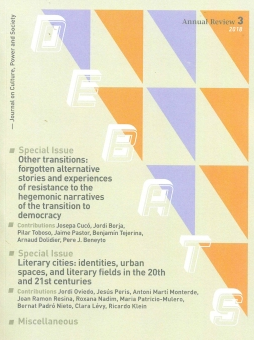The lit city: València in the texts of Max Aub
Palabras clave:
exile, memory, city, Spanish Civil War, Spanish Second Republic, 20th Century, València, Max Aub.Resumen
The city of València often appears in the works of Max Aub. Sometimes in descriptions of the author’s childhood between 1905–1910, and others—most of the time—during the years of the Spanish Civil War in the El laberinto mágico novels, especially in Campo abierto and Campo de los almendros. In this article I analyse the texture of these representations, what the València he describes is like, which of its features he emphasises, the neighbourhoods his characters inhabit and live, etc. In other words, how Max Aub—from exile—builds a new map of the city, remembering it with surprising precision and linking it to smells, sounds, feelings, and particular people and places. I also observe the contrasts between this city and the real València that he visited in 1969 and which he describes in his ‘Spanish diary’, La gallina ciega. His writing about the impact of this shock gives us insight into the meaning that his imagined city had on his work. València, the illuminated city, traversed by the smell of magnolias and orange blossom, and where the author studied at secondary school, is the scene of the lost paradise of childhood, and also one of a collective project. The map of the lost city is where the Second Spanish Republic became reality, where an imagined community linked to sentimental and family memories, became real. It was there that this collective project came to life and got its emotions, and this is how it appears in his fiction written from exile.Descargas
Descargas
Publicado
Cómo citar
Número
Sección
Licencia
Sin perjuicio de lo dispuesto en el artículo 52 de la Ley 22/1987 de 11 de noviembre de Propiedad Intelectual, BOE del 17 de noviembre de 1987, y conforme al mismo, los autores o autoras ceden a título gratuito sus derechos de edición, publicación, distribución y venta sobre el artículo, para que sea publicado en Debats. Revista de cultura, poder y sociedad.
Debats. Revista de cultura, poder y sociedad se publica bajo el sistema de licencias Creative Commons según la modalidad «Reconocimiento - NoComercial (by-nc): Se permite la generación de obras derivadas siempre que no se haga un uso comercial. Tampoco se puede utilizar la obra original con finalidades comerciales».
Así, cuando el autor o autora envía su colaboración, acepta explícitamente esta cesión de derechos de edición y de publicación. Igualmente autoriza a Debats. Revista de cultura, poder y sociedad, la inclusión de su trabajo en un fascículo de la revista para que se pueda distribuir y vender.











